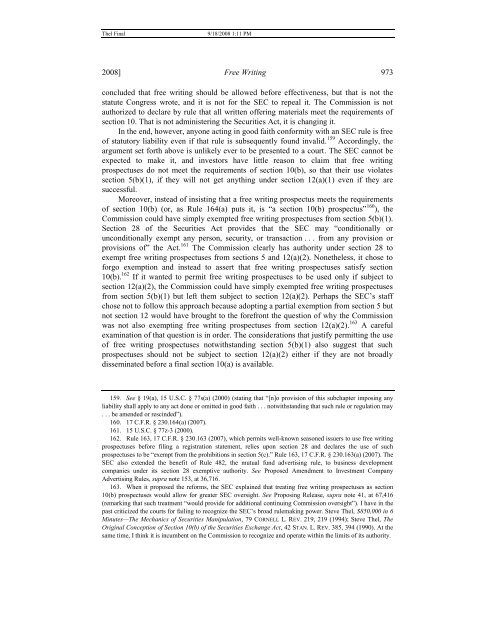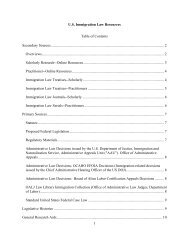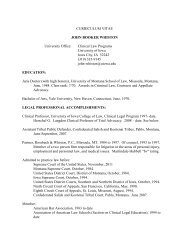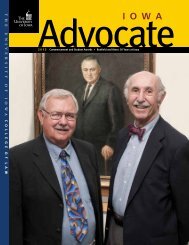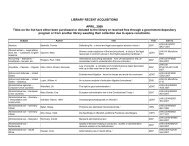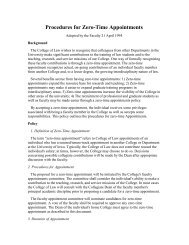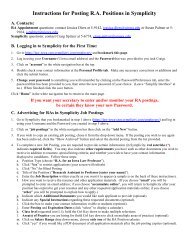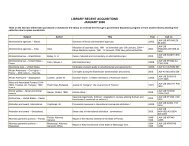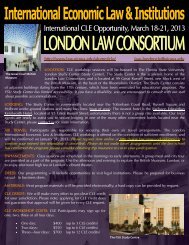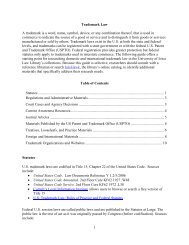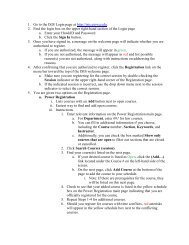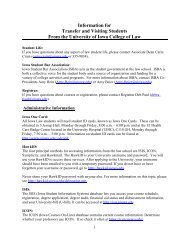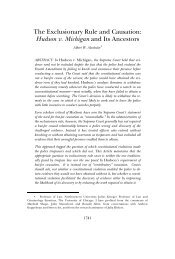Free Writing Steve Thel*
Free Writing Steve Thel*
Free Writing Steve Thel*
- No tags were found...
Create successful ePaper yourself
Turn your PDF publications into a flip-book with our unique Google optimized e-Paper software.
Thel Final9/18/2008 1:11 PM2008] <strong>Free</strong> <strong>Writing</strong> 973concluded that free writing should be allowed before effectiveness, but that is not thestatute Congress wrote, and it is not for the SEC to repeal it. The Commission is notauthorized to declare by rule that all written offering materials meet the requirements ofsection 10. That is not administering the Securities Act, it is changing it.In the end, however, anyone acting in good faith conformity with an SEC rule is freeof statutory liability even if that rule is subsequently found invalid. 159 Accordingly, theargument set forth above is unlikely ever to be presented to a court. The SEC cannot beexpected to make it, and investors have little reason to claim that free writingprospectuses do not meet the requirements of section 10(b), so that their use violatessection 5(b)(1), if they will not get anything under section 12(a)(1) even if they aresuccessful.Moreover, instead of insisting that a free writing prospectus meets the requirementsof section 10(b) (or, as Rule 164(a) puts it, is “a section 10(b) prospectus” 160 ), theCommission could have simply exempted free writing prospectuses from section 5(b)(1).Section 28 of the Securities Act provides that the SEC may “conditionally orunconditionally exempt any person, security, or transaction . . . from any provision orprovisions of” the Act. 161 The Commission clearly has authority under section 28 toexempt free writing prospectuses from sections 5 and 12(a)(2). Nonetheless, it chose toforgo exemption and instead to assert that free writing prospectuses satisfy section10(b). 162 If it wanted to permit free writing prospectuses to be used only if subject tosection 12(a)(2), the Commission could have simply exempted free writing prospectusesfrom section 5(b)(1) but left them subject to section 12(a)(2). Perhaps the SEC‟s staffchose not to follow this approach because adopting a partial exemption from section 5 butnot section 12 would have brought to the forefront the question of why the Commissionwas not also exempting free writing prospectuses from section 12(a)(2). 163 A carefulexamination of that question is in order. The considerations that justify permitting the useof free writing prospectuses notwithstanding section 5(b)(1) also suggest that suchprospectuses should not be subject to section 12(a)(2) either if they are not broadlydisseminated before a final section 10(a) is available.159. See § 19(a), 15 U.S.C. § 77s(a) (2000) (stating that “[n]o provision of this subchapter imposing anyliability shall apply to any act done or omitted in good faith . . . notwithstanding that such rule or regulation may. . . be amended or rescinded”).160. 17 C.F.R. § 230.164(a) (2007).161. 15 U.S.C. § 77z-3 (2000).162. Rule 163, 17 C.F.R. § 230.163 (2007), which permits well-known seasoned issuers to use free writingprospectuses before filing a registration statement, relies upon section 28 and declares the use of suchprospectuses to be “exempt from the prohibitions in section 5(c).” Rule 163, 17 C.F.R. § 230.163(a) (2007). TheSEC also extended the benefit of Rule 482, the mutual fund advertising rule, to business developmentcompanies under its section 28 exemptive authority. See Proposed Amendment to Investment CompanyAdvertising Rules, supra note 153, at 36,716.163. When it proposed the reforms, the SEC explained that treating free writing prospectuses as section10(b) prospectuses would allow for greater SEC oversight. See Proposing Release, supra note 41, at 67,416(remarking that such treatment “would provide for additional continuing Commission oversight”). I have in thepast criticized the courts for failing to recognize the SEC‟s broad rulemaking power. <strong>Steve</strong> Thel, $850,000 in 6Minutes—The Mechanics of Securities Manipulation, 79 CORNELL L. REV. 219, 219 (1994); <strong>Steve</strong> Thel, TheOriginal Conception of Section 10(b) of the Securities Exchange Act, 42 STAN. L. REV. 385, 394 (1990). At thesame time, I think it is incumbent on the Commission to recognize and operate within the limits of its authority.


